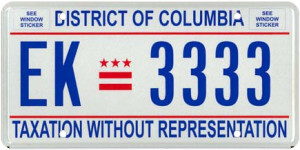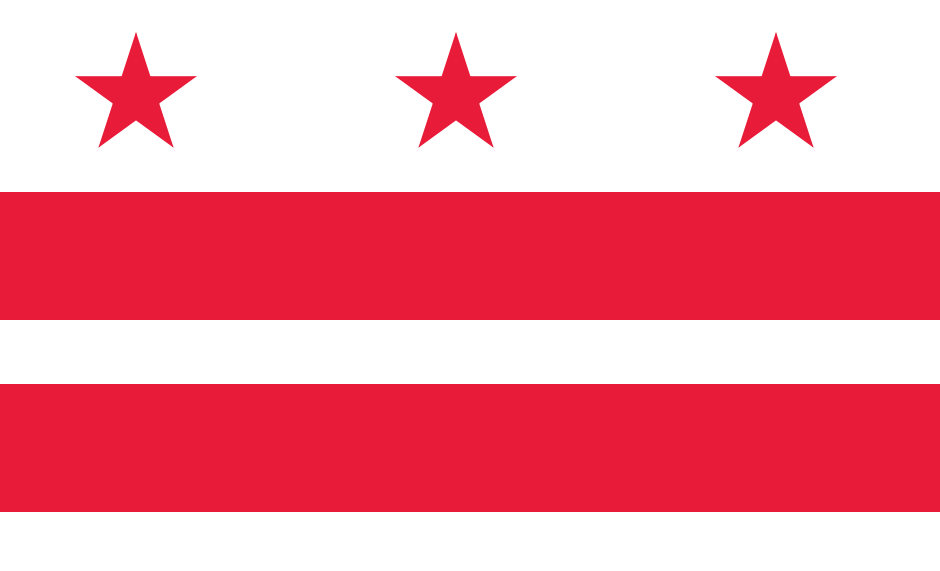On November 4, residents of Washington, D.C. voted to legalize the recreational use of marijuana by voting overwhelmingly in favor of Initiative 71. Residents of D.C., however, won’t be able to light up immediately. Like with most other D.C. laws, Congress now has 60 days to review and possibly overturn Initiative 71, which passed with almost 70 percent of the vote. Supporters now worry that a Republican dominated Congress will move to block legalization of recreational marijuana. Recreational legalization in Colorado, Washington state and now Oregon and Alaska also face federal threats. But there’s one key difference between these four states and D.C.: Unlike the states’ residents, the capital’s residents have no say in Congress. Washington, D.C. does elect a delegate to the House of Representative, but they have no voting powers. Despite paying federal and city taxes, Washington’s citizens are ultimately subject to federal control without any political recourse to influence their own governance.
In 2011, as part of a deal to avert a government shutdown, the Washington city government was prevented from funding abortions for low-income women, despite support for the program from the city’s elected leaders. That same deal also renewed a controversial private school voucher program. Similarly, in 2009 and 2011, Congress blocked a needle-sharing program for drug users in the district, and although Congress initially resisted, it ultimately allowed D.C. to decriminalize marijuana this July.
In response to this lack of democratic control, there has been a growing movement in Washington for greater autonomy and possible statehood as “New Columbia.” To become a state, a territory must fir st petition Congress, draw up a democratic constitution and then be approved by a simple majority in the House and Senate. The district’s government has officially petitioned for statehood since drawing up a constitution in 1982. The capital has had a few small victories. The 23rd Amendment, ratified in 1961, gave Washington residents Electoral College votes for presidential elections. And residents were first allowed to directly elect their mayor and city council in 1973. But these small gains haven’t been enough to wipe away all dreams of statehood — the first congressional hearing on statehood in 20 years was held last month, but only two senators showed up, and it was seen as mostly ceremonial.
st petition Congress, draw up a democratic constitution and then be approved by a simple majority in the House and Senate. The district’s government has officially petitioned for statehood since drawing up a constitution in 1982. The capital has had a few small victories. The 23rd Amendment, ratified in 1961, gave Washington residents Electoral College votes for presidential elections. And residents were first allowed to directly elect their mayor and city council in 1973. But these small gains haven’t been enough to wipe away all dreams of statehood — the first congressional hearing on statehood in 20 years was held last month, but only two senators showed up, and it was seen as mostly ceremonial.
In the Federalist Papers, James Madison argued for the “indispensable necessity of complete authority at the seat of government.” Essentially, the founders argue that the federal government shouldn’t be beholden to state interests or constrained in any way by sharing its territory. The current power structure in D.C., in theory, serves that purpose: Giving Congress ultimate control over any local government action in D.C. seeks to avoid undue influence from a local government on the federal system — exactly the conflict Madison warned against. However, in practice, Washington has become more than the political stage on which partisan struggles are played out — it has frequently become a pawn in those very struggles, irrespective of its residents’ wishes. The Constitution provides for a federal district — Washington’s current status — and sets a maximum size (100 square miles), but does not set a minimum. The problems the founders enumerated could be overcome – while granting residents of D.C. representation – if a small federal district remained surrounded by New Columbia — Washington could become a state while the federal government remains its own, much smaller, enclave. But the road to statehood is paved with potential difficulties — foremost is partisan opposition.
Washington, D.C. is heavily Democratic. Conservatives fear that making it a 51st state would essentially add two more Democrat senators, thus shifting the body’s balance of power. While the additional representative in the House would likely be Democratic as well, their influence would be much smaller in that much larger body. While two additional D.C. senators and a representative may not ultimately swing votes on local affairs, a new ability to filibuster and logroll would give the district far more influence than it currently has. As a result of Republican opposition, any bill to grant D.C. statehood would likely require a supermajority to pass. While legally only a simple majority is required to create a new state, partisan opposition would likely invoke the filibuster thus requiring a 60 vote cloture to pass. Republicans, though, are not the only ones opposed to D.C. statehood. Some Democrats, especially from swing states, are hesitant to support the movement for fear of being portrayed as power grabbers back home.
There is not only political, but also ideological opposition to granting Washington, D.C. statehood. Again, many point to the intentions of the founding fathers and argue that a “New Columbia” would give disproportionate power to a narrow set of interests. The capital’s population is larger only than Vermont’s and Wyoming’s, but packed in an urban area of 67 square miles. And some fear that statehood would essentially make D.C. a shill for federal interests, since a high proportion of its economy and workforce would remain dependent on the proximity of the federal government. Furthermore, in the past, there has been a racial component in denying voting rights to D.C. citizens. Resistance to introducing representation for D.C. in the 1960s was partly based on the desire to prevent the election of black, Democratic legislators by the capital’s majority black population.
There has been some consideration to give Washington voting representatives without letting it become a full state. A 2010 plan almost gave Washington a vote in the House, in exchange for Republican-dominated Utah receiving an additional seat. The deal ultimately fell through after Republicans pushed for the inclusion of a drastic loosening of gun control laws in D.C. Giving D.C. voting representation directly while remaining a district, is also more constitutionally dubious than outright statehood since House members must be elected “by the people of the several states.” As a result, giving D.C. voting rights without statehood may require a constitutional amendment. Such an amendment might be possible but would be extremely difficult to pass. An amendment must be approved by two-thirds of Senators and Representatives, and then be ratified by three-fourths of the states. Considering the partisan difficulties to granting D.C. statehood, a consensus of that magnitude is unlikely to emerge anytime soon.
The capital’s third option is retrocession to Maryland. With the exception of a federal enclave, the rest of Washington could become part of the state of Maryland — the state to which it initially belonged. There is precedent for the action. In 1847, large parts of Washington, including Alexandria, were returned to Virginia. Supporters argue that retrocession would benefit both D.C. and Maryland. Residents of Washington would get the right to vote, be less restrained by the federal government and gain greater autonomy over their own affairs. Meanwhile, Maryland would increase its tax base and gain an additional representative. The plan would grant D.C. citizens voting representation without increasing the number of senators, as Maryland’s senators would represent former D.C. citizens. Yet, despite its seeming benefits, retrocession has not caught on in either Washington or Maryland. Washington residents feel that they would simply be subsumed into the larger state without significantly changing their lack of representation. Washingtonians and Marylanders also have strong disparate identities that they are unwilling to relinquish.
The citizens of Washington, D.C. are trapped in political limbo. They pay $24 billion in taxes — more than 21 states and higher than all 50 on a per capita basis — to a federal government in which they have no representation but that still retains much control over the district’s affairs. Ironically, the federal government’s unique control over Washington, which lacks constitutional limits, has led to it becoming a political bargaining piece, subject to the whims of partisan bickering — exactly the situation the founders had hoped to avoid. However, any plan to resolve this situation will come under intense scrutiny and may be politically toxic to supporters, both Democratic and Republican. The slogan on Washington license plates, “Taxation Without Representation,” is unlikely to change in the foreseeable future.

Most of the above is rather beside the point.
One of the fundamental First Principles of participative government is that “Just Power derives from the Consent of the Governed [ALL the Governed].” Power exercised lacking such consent is Tyrannical and Illegitimate. All else is detail.
The ostensible Constitutional “mandate” that Congress should exercise absolute Power over the District “in all cases whatsoever” is absolutely incompatible and incongruent with participative government. As with the Declaratory Act of 1766 by the British Parliament, it is the embodiment of Tyranny.
There ARE other options than those mentioned above. For one thing, other expatriate Americans who live abroad, for example, sometimes permanently with no intention to return, are nevertheless allowed to continue to vote absentee in whatever state in which they last resided. If they are “people of the several states (note, it does not say “RESIDENTS” of the several states), they so are people living in DC, since they are inarguably “of” the nation comprised of the several states. DC was part of the original colonies, regarding which the Founders pledged Lives, Fortunes, and Sacred Honor to secure Liberty for themselves and their progeny. They are people “OF” the several states, not people “OF” the Argentinean pampas, the Australian outback, the Asian steppes, nor the Arctic tundra.
One option would be to allow individual DC residents to declare affiliation or affinity with one specific state, and vote there absentee, as do other American expatriates resident elsewhere around the world.
If, along with the above, Congress limited itself to over-riding DC laws only with a super-majority of both houses, that would go a long way to providing reasonable Consent of the Governed on behalf of DC denizens.